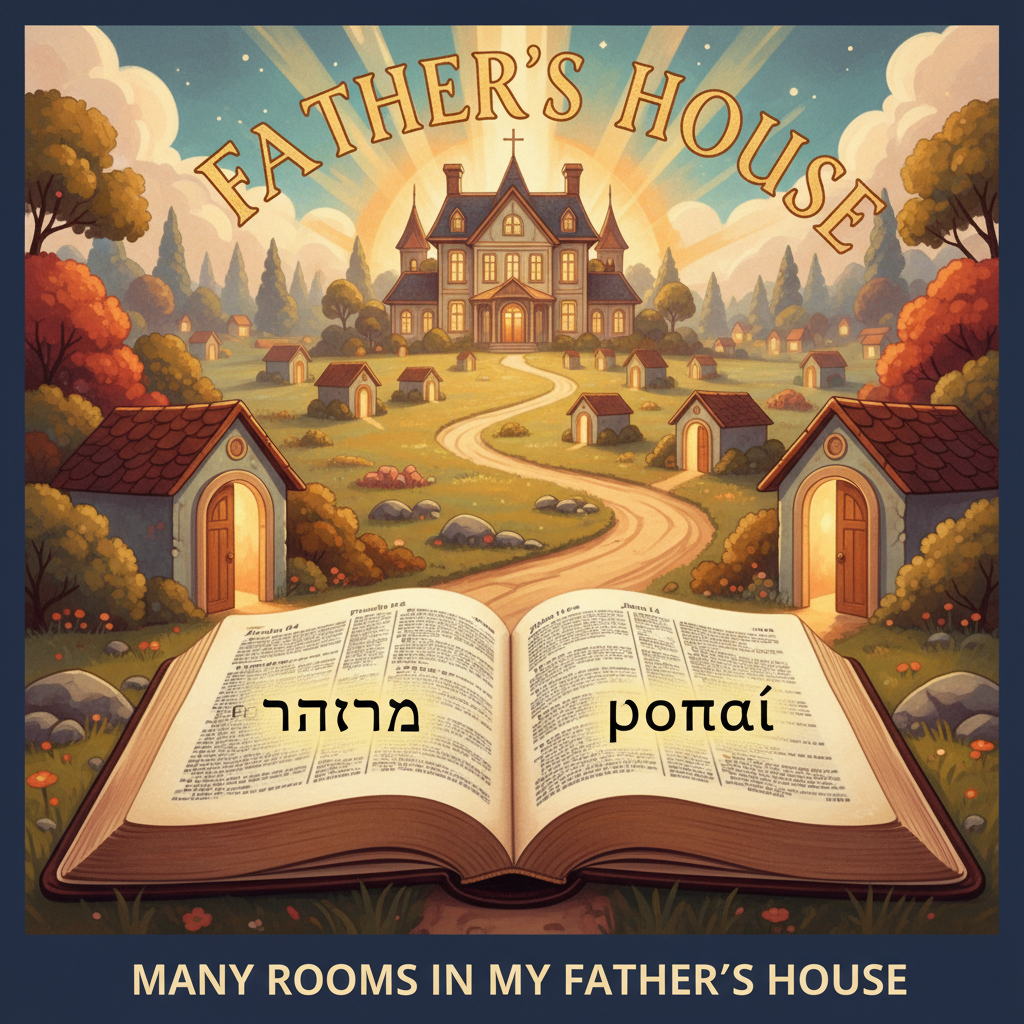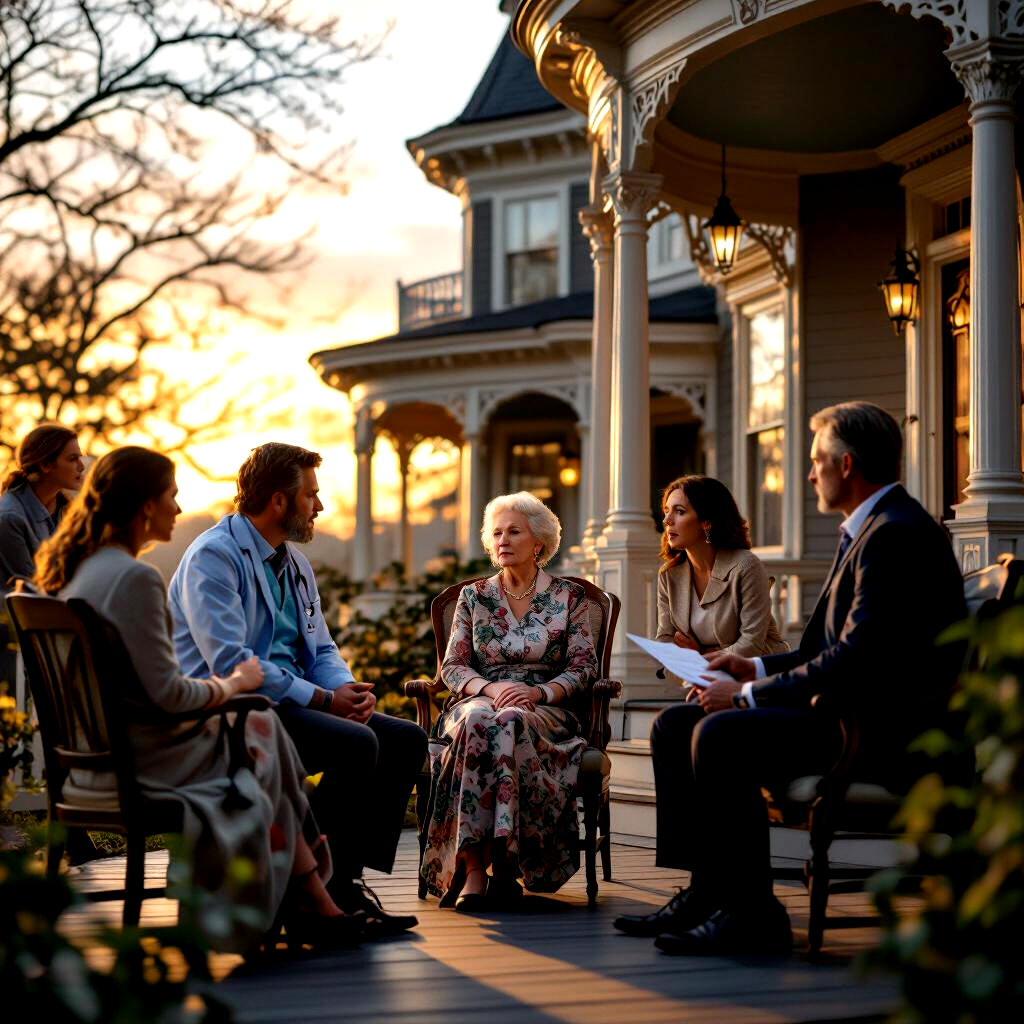Finding Our Eternal Home: A Look at God’s Many Dwelling Places
Have you ever noticed how Scripture often uses grammar to reveal deeper spiritual truths? Two powerful passages—one from the Psalms and one from the words of Jesus—beautifully illustrate God’s abundant provision for His people through the use of a simple linguistic feature: the plural noun.
Let’s start in Psalm 84:1–2. In the original Hebrew, the word translated as “dwelling place” is mishkanotekha—a plural form. It literally means “your dwelling places.” This isn’t a mistake or a reference to multiple physical temples. Instead, it’s a common Hebraism used to express majesty, fullness, and the all-encompassing nature of God’s presence. The psalmist isn’t just talking about a single location; he’s marveling at the abundant, multi-faceted refuge that God provides.
This same theme carries right into the New Testament. In John 14:2, Jesus tells His disciples, “In my Father’s house are many dwelling places” (the Greek word is monai). Some translations say “mansions,” but the core idea is the same: prepared, personal abodes within God’s household. Jesus wasn’t describing a heavenly subdivision with literal mansions. He was using the plural to emphasize the certainty, generosity, and tailored provision He has made for each of His followers.
What’s the takeaway?
God doesn’t do things minimally. When He makes a home for us, it’s not a cramped spiritual bunker—it’s a place of belonging, designed with divine intentionality. Whether in the poetic longing of the Psalms or the comforting promise of Christ, Scripture consistently points us toward a God whose love is expansive, personal, and majestically abundant.
Why I Believe in a Locked Door: A Common-Sense Case for Border Security
Let’s talk about borders using an analogy everyone can understand: your home.
You lock your doors at night. You probably don’t let strangers wander into your house uninvited. This isn’t because you’re a bad person or unwelcoming; it’s because you’re responsible. You have a duty to protect your family from the very real risks of home invasion, burglary, or worse.
A nation’s border is its front door. When that door is left unlocked—or worse, intentionally opened—it’s an abandonment of the most basic duty of a government: to protect its citizens.
Here’s why this matters:
- Vetting is Basic Responsibility. Would you let a stranger claiming to be a repairman into your home without checking his ID or credentials? Of course not. Yet, we’ve allowed millions to enter our country without knowing who they are, their criminal history, or their intentions. This isn’t security; it’s recklessness.
- Our Resources Are Finite. Every unvetted person who enters represents a potential strain on our schools, hospitals, and social safety nets—all paid for by American taxpayers. It’s like having uninvited guests move in, eat your food, and run up your bills while you’re trying to provide for your own family.
- National Security is Not a Joke. Among the millions who have entered, we know for a fact that cartel members, gang affiliates, and even individuals on the terrorist watchlist have been caught. How many more got through? When your front door is open, you don’t just get friendly neighbors; you also get people who wish you harm.
- A Nation is More Than a Place. It’s a people with a shared language, culture, and set of values. Mass, unvetted immigration doesn’t enrich that shared identity; it fractures it. It’s the difference between welcoming a few guests and having a crowd force their way in and demand you change your way of life to suit them.
A locked door isn’t about hate. It’s about love for your family, your community, and your country. It’s about the fundamental right to safety, security, and self-preservation.
It’s time we started acting like a nation that values its own home enough to lock the door.
Holiday Shopping Tips
The holiday shopping season represents a critical period for both retailers and consumers, with Black Friday and Cyber Monday standing as its commercial pillars. While these events promise significant savings, they also present numerous pitfalls for the unwary shopper. Understanding the mechanics behind these sales, recognizing genuine value, and employing strategic shopping methods can turn these crowded, high-pressure events into opportunities for meaningful savings.
How Retailers Approach Black Friday and Cyber Monday
Retailers plan for these sales months in advance, often using a mix of genuine discounts on popular items and less impressive offers on overstock or lower-demand products. Some common tactics include:
- Doorbusters: Extremely low prices on a limited number of high-demand items to draw crowds, both online and in-store.
- Price Anchoring: Inflating the “original” price to make the discount appear larger than it truly is.
- Bundle Deals: Offering complementary products together, which can represent good value if you need all items, but may encourage unnecessary spending.
- Limited-Time Offers: Creating urgency through countdown timers or limited stock notices to prompt impulsive purchases.
Retailers also use data from previous years to anticipate demand, adjust inventory, and maximize profit margins. Online retailers frequently employ dynamic pricing, where algorithms adjust prices in real-time based on demand, competitor pricing, and user browsing behavior.
Differentiating Real Deals from Gimmicks
Not every advertised discount is worth your attention. Here’s how to spot the difference:
- Research Prices in Advance: Use tools like CamelCamelCamel for Amazon, Honey for broader online tracking, or simply note prices on items you’re interested in weeks before the sale. This helps you recognize whether a “50% off” claim is legitimate or based on an inflated original price.
- Check Product Specifications: Some retailers sell slightly downgraded versions of popular products specifically for Black Friday. Compare model numbers and features to ensure you’re getting the same quality.
- Read the Fine Print: Look for restrictions like limited quantities, exclusions on returns, or additional costs such as shipping fees that might negate the savings.
- Avoid “Buy Now, Pay Later” Traps: While installment plans can seem convenient, they often encourage overspending and may include hidden fees or high interest rates if not paid promptly.
Strategic Shopping: Online vs. In-Store
Online Shopping Tips
- Use Price Comparison Tools: Extensions like PriceBlink or Keepa can automatically compare prices across retailers.
- Leverage Cashback and Rewards: Sign up for cashback websites (e.g., Rakuten) or use credit cards that offer bonus points on online purchases.
- Watch for Early Access: Many retailers offer exclusive deals to email subscribers or members before the official sale begins.
- Beware of Shipping Deadlines: Ensure delivery times align with your needs, especially for holiday gifts.
In-Store Shopping Tips
- Plan Your Route: Identify which stores have the items you want and prioritize based on opening times and availability.
- Arrive Early, But Not Necessarily First: The initial rush can be chaotic. Sometimes, waiting a few hours allows crowds to thin while stock remains.
- Check Online Inventory First: Use store apps or websites to verify local stock, avoiding wasted trips.
- Stay Focused: Stick to your list to avoid impulse buys triggered by store layouts or frenzied atmospheres.
General Smart Shopping Practices
- Set a Budget: Decide beforehand how much you’re willing to spend and stick to it.
- Prioritize Needs Over Wants: Focus on purchasing items you already intended to buy rather than being swayed by discounts on non-essentials.
- Consider Total Cost: For larger items, factor in potential future expenses like accessories, subscriptions, or maintenance.
- Understand Return Policies: Sale items sometimes have stricter return conditions. Know the terms before purchasing.
What to Avoid
- Impulse Buys: Flashy displays and limited-time offers are designed to trigger quick decisions. Pause and evaluate whether you truly need the item.
- Extended Warranties: These are often high-margin products for retailers and rarely provide value proportional to their cost.
- Fear of Missing Out (FOMO): Just because something is on sale doesn’t mean it won’t be discounted again. If it’s not a priority, skipping it might be wiser.
Conclusion
Black Friday and Cyber Monday can offer legitimate opportunities to save money, but they require a disciplined approach. By researching ahead, distinguishing marketing tricks from real value, and adhering to a plan, you can navigate these sales effectively. Remember, the goal isn’t to spend the most money possible but to make thoughtful purchases that align with your needs and budget. Whether shopping online or in-person, staying informed and focused will help you make the most of these seasonal events without falling prey to the frenzy.
The Elder Fraud Epidemic
Elder fraud is a $36 billion crisis targeting seniors through government impersonation, tech support, and romance scams. This blog post details why the elderly are vulnerable, exposes common criminal methods with real case studies, and provides essential steps for protection and prevention.
Protecting Our Seniors From Financial Predators
Elder fraud has become a sophisticated criminal industry draining an estimated $36 billion annually from older Americans. The FBI reports that seniors lose more money to scams than any other demographic group, with devastating consequences for victims who often lose their life savings.
Why Elderly Targets Are Vulnerable
Several factors make seniors particularly susceptible:
- Cognitive decline: Age-related changes can impair judgment and decision-making
- Social isolation: Lonely seniors are more receptive to scammers posing as friendly contacts
- Technological gaps: Many lack digital literacy to recognize sophisticated online schemes
- Financial stability: Scammers target those with accumulated savings and home equity
- Trusting nature: Older generations often maintain more trusting attitudes toward strangers
Scammer Profiles and Methods
Perpetrators range from organized crime rings to individual opportunists:
- International call centers (particularly from India, Nigeria, and Eastern Europe)
- Domestic fraud rings operating through fake charities and businesses
- Romance scammers building false emotional connections
- Unscrupulous family members or caregivers
Common techniques include:
- Spoofing caller IDs to appear as government agencies
- Creating urgency with threats of legal action or arrest
- Using psychological manipulation and building false trust over time
- Employing cryptocurrency and gift cards to avoid traceability
Most Prevalent Schemes
- Government Impersonation: IRS, Social Security, or Medicare scams threatening arrest or benefit cancellation
- Tech Support: Fake alerts about computer viruses requiring immediate payment
- Romance Scams: Building relationships online to eventually request money
- Grandparent Scams: Pretending to be grandchildren in emergency situations
- Sweepstakes/Lotteries: Demanding fees to claim nonexistent winnings
Notable Cases and Losses
- A 78-year-old Michigan widow lost $600,000 to a romance scammer posing as an oil rig engineer
- California seniors lost over $1 million to callers impersonating Social Security officials
- An 85-year-old Florida man was defrauded of $300,000 through fake tech support calls
- The IRS impersonation scam alone has victimized thousands, with individual losses averaging $5,000
Protective Measures for Seniors
- Verify identities: Hang up and call official numbers directly
- Slow down: Scammers create false urgency – legitimate matters allow time
- Implement financial safeguards: Use delayed wire transfers and account monitoring
- Stay connected: Maintain social networks to reduce isolation vulnerability
- Educate continuously: Learn about new scam tactics through AARP and FTC resources
- Use technology: Install call-blocking apps and enable two-factor authentication
- Consult trusted advisors: Involve family members or attorneys in major financial decisions
Financial institutions and adult children should monitor for warning signs like sudden large withdrawals, new “friends” influencing decisions, or uncharacteristic secretiveness about finances.
Elder fraud represents both a criminal and societal failure. By understanding these threats and implementing protective measures, we can help safeguard our seniors’ financial security and dignity.
All My Days Turning as the World Lives
The Days of Our Lives in Pine Valley were usually quiet, but that was before All My Children came home for the annual Founder’s Day festival. It was As the World Turns that old secrets begin to surface, casting long shadows under the summer sun.
My mother, the matriarch, always said our family was like One Life to Live, a single thread in a larger tapestry. But as I stood on the porch of The Bold and the Beautiful Victorian on Elm Street, watching the chaos unfold, it felt more like we were all just Guiding Light for each other’s poor decisions.
It started when my sister, The Young and the Restless, announced she was leaving her husband for a man she’d met on Another World—a cruise ship bartender named Fernando. My father, a stalwart of General Hospital, simply sighed and said, “This is what happens when you Search for Tomorrow in all the wrong places.”
The real drama, however, began at the town’s only elegant restaurant, Ryan’s Hope. Over a tense dinner, my uncle, a lawyer from The Edge of Night, revealed he’d found documents proving the deed to the family estate was fraudulent. “It seems our rightful Brighter Day was built on a lie,” he intoned, sipping his brandy.
Suddenly, our lives felt like a cheap episode of Passions, full of swirling accusations and gasped revelations. My grandmother, the true Love of Life in our family, merely smiled serenely and said, “Oh, hush. We’ve weathered worse. This is just a Port Charles in our storm.”
She was right, of course. By the time the last guest left and we were cleaning up the discarded streamers, a sense of calm had returned. We were bruised, but not broken. We sat together on the porch swing, watching the sunset paint the sky, a family once again united. It was, we all silently agreed, a truly Beautiful end to the day.
Nocturne
Vivid Change
LYRICS
Pilkas rytas už lango
Žiemos spalvos dar miega
Kažkas keičiasi ore
Jaučiu – ateina kažkas
Oooh, matau kaip keičiasi viskas
Spalvos dažo mano dienas
Kiekviena nauja pradžia
Pilkas pasaulis tampa vaivorykšte
Ooo-ooo-aaaa
(Spalvos, spalvos)
Ooo-ooo-aaaa
(Keičiasi viskas)
Raudona kaip meilė širdyje
Geltona kaip saulės šviesa
Violetinė kaip vakarai
Kai dangus apkabina laukus
Baltą žiemą užmirštu
Kai spalvos pražysta many
Oooh, matau kaip keičiasi viskas
Spalvos dažo mano dienas
Kiekviena nauja pradžia
Pilkas pasaulis tampa vaivorykšte
Mažos akimirkos
Švelnūs prisilietimai
Gamtos spalvos
Keičia mane
Keičia mane
Oooh, matau kaip keičiasi viskas
(Matau kaip viskas atgyja)
Spalvos dažo mano dienas
(Spalvos manyje)
Kiekviena nauja pradžia
Pilkas pasaulis tampa vaivorykšte
Ooo-ooo-aaaa
(Vaivorykštė many)
Ooo-ooo-aaaa





